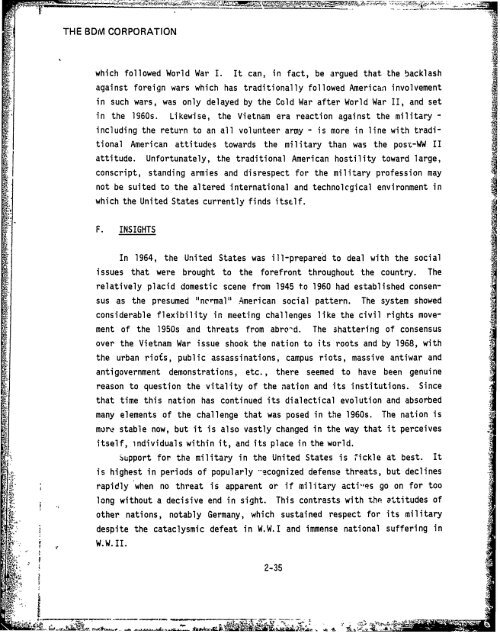policy - The Black Vault
policy - The Black Vault
policy - The Black Vault
Create successful ePaper yourself
Turn your PDF publications into a flip-book with our unique Google optimized e-Paper software.
THE BDM CORPORATION<br />
which followed World War I. It can, in fact, be argued that the backlash<br />
against foreign wars which has traditionally followed American involvement<br />
in such wars, was only delayed by the Cold War after World War II, and set<br />
in the 1S60s. Likewise, the Vietnam era reaction against the military -<br />
including the return to an all volunteer army - is more in line with traditional<br />
American attitudes towards the military than was the posx-WW II<br />
attitude.<br />
Unfortunately, the traditional American hostility toward large,<br />
conscript, standing armies and disrespect for the military profession may<br />
not be suited to the altered international and technolcgical environment in<br />
which the United States currently finds itself.<br />
F. INSIGHTS<br />
In 1964,<br />
the United States was ill-prepared to deal with the social<br />
issues that were brought to the forefront throughout the country. <strong>The</strong><br />
relatively placid domestic scene from 1945 to 1960 had established consensus<br />
as the presumed "normal" American social pattern. <strong>The</strong> system showed<br />
considerable flexibility in meeting challenges like the civil rights movement<br />
of the 1950s and threats from abro-d.<br />
<strong>The</strong> shattering of consensus<br />
over the Vietnam War issue shook the nation to its roots and by 1968, with<br />
the urban riots, public assassinations, campus riots, massive antiwar and<br />
antigovernment demonstrations, etc., there seemed to have been genuine<br />
reason to question the vitality of the nation and its institutions. Since<br />
that time this nation has continued its dialectical evolution and absorbed<br />
many elements of the challenge that was posed in the 1960s.<br />
more stable now,<br />
<strong>The</strong> nation is<br />
but it is also vastly changed in the way that it perceives<br />
itself, individuals within it, and its place in the world.<br />
Support for the military in the United States is fickle at best.<br />
is highest in periods of popularly "-ecognized defense threats, but declines<br />
rapidly when no threat is apparent or if military acties go on for too<br />
'long without a decisive end in sight. This contrasts with th attitudes % of<br />
other nations, notably Germany, which sustained respect for its military<br />
despite the cataclysmic defeat in W.W.I and immense national suffering in<br />
W.W.II.<br />
It<br />
2-35<br />
4.1 A.
















